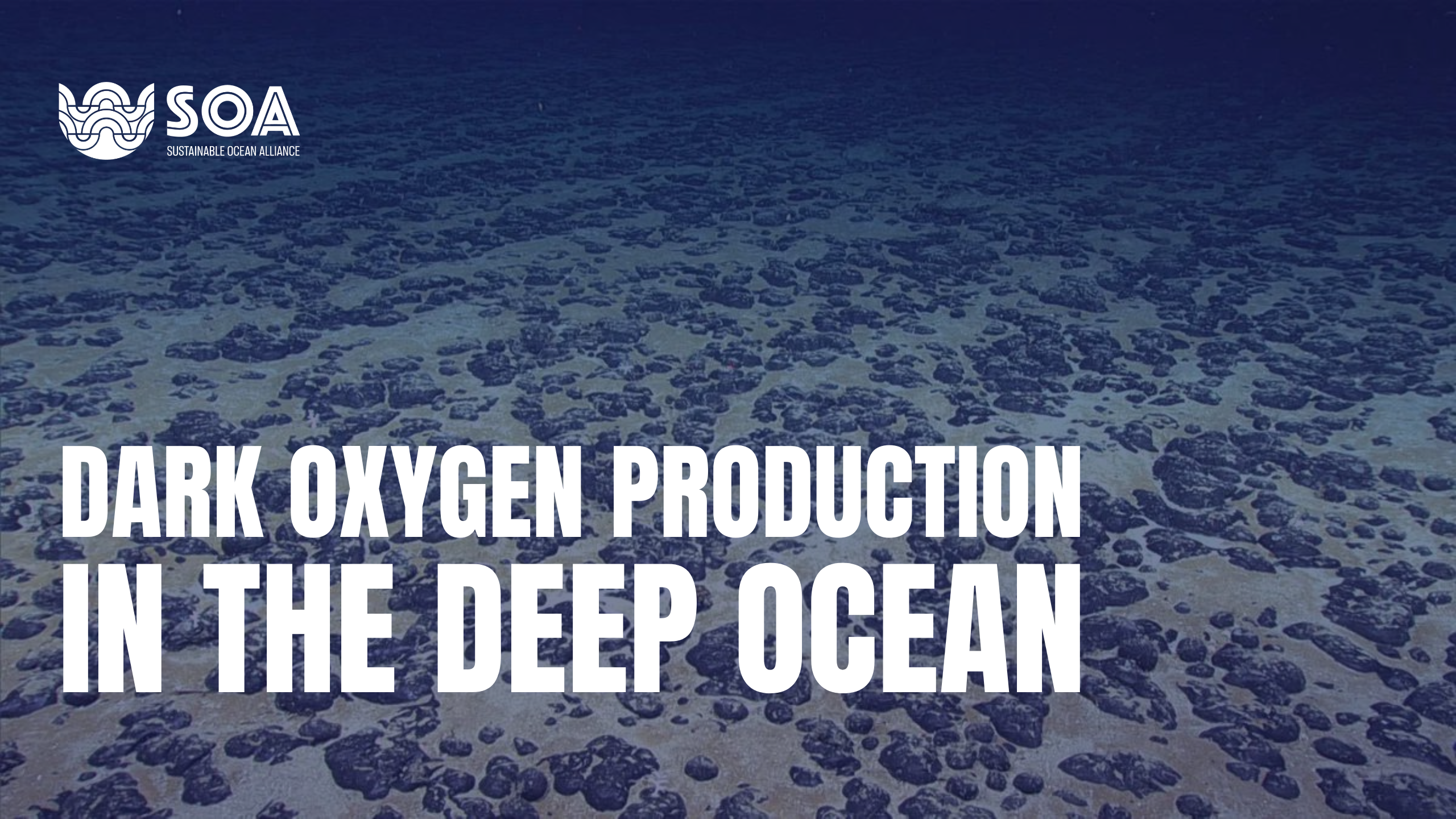New scientific research in the Clarion Clipperton Zone of the Pacific Ocean showcases evidence of ‘dark oxygen’ production at the abyssal seafloor, pointing to the need for greater protection of deep-sea ecosystems.
Kingston, Jamaica – (July 23, 2024) As the world’s largest network of young ocean leaders, Sustainable Ocean Alliance (SOA) commends the significant discovery made by an international team of scientists revealing a new-to-science process of ‘dark oxygen’ production on the abyssal seafloor of the Pacific Ocean.
This groundbreaking finding, published in Nature Geoscience by a team of marine scientists, has the potential to transform humanity’s understanding of the planet’s oxygen production systems and highlights the critical need for precautionary approaches in extractive activities like deep-sea mining. This discovery was announced simultaneously at the International Seabed Authority (ISA) Council Meetings taking place in Kingston, Jamaica, to negotiate international regulations on deep-sea mining.
Key Findings
1. Deep-Sea Oxygen Production: During experiments conducted in the Nauru Ocean Resources Inc. (NORI-D) license area of the Clarion-Clipperton Zone (CCZ), researchers observed a notable increase in oxygen concentrations within benthic chambers. This phenomenon, known as ‘dark oxygen production’ (DOP), indicates that more oxygen is being produced than consumed, a discovery that challenges previous deep-sea oxygen flux studies.
2. Proposed Mechanism: Scientists propose that this oxygen increase may be a result of seawater electrolysis, facilitated by high voltage potentials on the surfaces of polymetallic nodules. These nodules, composed of manganese, nickel, copper, and cobalt, may function as "geo-batteries," promoting oxygen production in the absence of light.
3. Ecological Significance: DOP may provide a crucial source of oxygen for the respiration of benthic organisms on the seafloor, underscoring the importance of these processes in abyssal ecosystems.
4. Implications for Deep-Sea Mining: The discovery emphasizes the urgent need for precautionary approaches and strict regulations before commencing deep-sea mining activities. Disrupting these vital processes could have significant and yet unknown ecological consequences.
Call to Action from SOA
“Dark oxygen production, yet another benefit that the deep sea provides to the ocean's ecosystem, could potentially be lost if deep-sea mining moves forward. This is why precautionary approaches to mining practices are necessary to protect not only bottom-dwelling deep-sea organisms but also the ocean’s entire delicate ecosystem. Sustainable Ocean Alliance firmly believes that a deep-sea mining moratorium and a halt to drafting regulations should take hold overall. There is still a lack of comprehensive understanding of the vital and intricate deep-sea ecosystem, and it should not be compromised by hasty industrial activities. Our global efforts should be put towards understanding and supporting the deep sea, not extracting from it for short-term profits.”– Daniel Cáceres Bartra, SOA Regional Representative for Hispanoamérica and Head of Delegation at the International Seabed Authority
“Each deep-sea scientific expedition reveals unexpected knowledge about humanity's perception of our planet's largest biome, the ocean. The results conveyed by Sweetman et al. 2024 on the production of dark oxygen by polymetallic nodules not only reveal unexpected truths, but also highlight the importance of acting according to the Precautionary Principle. Our very limited knowledge of these ecosystems has the potential to boost investments in critical scientific research. By implementing a moratorium on deep-sea mining, we can prevent catastrophic impacts of an industry like deep-sea mining and allow current and future generations to truly benefit from the peculiarity of the deep-sea for the common benefit of humankind.” – Eugénia Barroca, SOA Regional Representative for Europe & Lusofonia and Delegation Strategy Lead for Europe at the International Seabed Authority
“Like the discovery of hydrothermal vents, cold seeps, organic falls, and benthic storms, all relatively recent, the discovery of polymetallic nodules potentially producing oxygen by seawater electrolysis (in the absence of light) may reshape our understanding of not only deep-sea ecosystems but of life on Earth. Mining these ecosystems without comprehensive knowledge could have catastrophic impacts on our planet's health, impacts we may not fully comprehend due to our limited baseline information. The call for a moratorium has never been more urgent.” – Jaime-Leigh Edghill, SOA Delegation Scientific Advisor at the International Seabed Authority
“This discovery emphasizes the interconnectedness of oceanic processes and the urgent need to protect our marine environments from potentially irreversible damage. The mechanisms behind dark oxygen production help us to appreciate the complexity and vulnerability of abyssal ecosystems and this is why we have to prioritize scientific research and environmental safeguards to ensure the sustainability of our oceans for future generations. This is especially pertinent under the frameworks of the Biodiversity Beyond National Jurisdiction (BBNJ) Treaty and other international agreements that stress the importance of Environmental Impact Assessments (EIAs).” — Leneka Rhoden, SOA Delegation Strategy Lead for Jamaica at the International Seabed Authority
About the Study
The study, Evidence of dark oxygen production at the abyssal seafloor, was conducted by a consortium of international institutions, including the Scottish Association for Marine Science (SAMS), Heriot-Watt University, GEOMAR Helmholtz Centre for Ocean Research Kiel, and Boston University.
The research team utilized advanced electrochemical techniques and high-resolution benthic chamber experiments to monitor oxygen fluxes on the abyssal seafloor. The study was funded by various organizations, including the Gordon and Betty Moore Foundation and the UK Natural Environment Research Council.
About Sustainable Ocean Alliance (SOA)
Sustainable Ocean Alliance is an international nonprofit organization dedicated to activating young people, developing and implementing innovative solutions, and mobilizing a global movement of ocean allies to restore the health of the ocean. In 2014, Daniela V. Fernandez founded SOA during her first year at Georgetown University to bring youth voices and solutions to the forefront of ocean sustainability and innovation.
Today, SOA has grown into the world’s largest network of young ocean leaders, innovators, and advocates. To date, the organization has accelerated over 420 ocean-based solutions to the greatest threats facing our ocean, including for-profit startups and community-led nonprofit projects worldwide.
Learn more about SOA’s campaign against deep-sea mining here.
Media Contacts
Download the PDF version of this press release here.
Sustainable Ocean Alliance Media Contact: SOA@globalstrategygroup.com
Study Author Contact: Dr. Andrew Sweetman, andrew.sweetman@sams.ac.uk




Comments